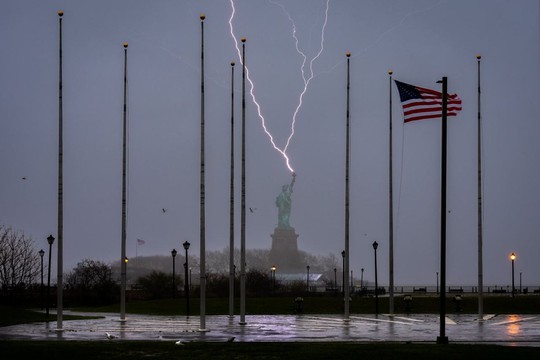Heaven warns – lightning strikes the US Statue of Liberty.
When Britain entered a slump in the 19th century, the Victorians reformed and had another good run. The US may be too polarized to do the same, writes Andreas Kluth, a Bloomberg Opinion columnist covering US diplomacy, national security and geopolitics.
It’s a question that has kept wonks and pols busy for years: Can America remain the world’s mightiest power, the better to defend its own interests as well as international order? Or is the US in the early stages of secular decline?
The Office of Net Assessment, a sort of in-house think tank for the Pentagon sponsored a series of reports by Rand, a research outfit in California. The authors — Michael Mazarr, Tim Sweijs and Daniel Tapia — looked into just about all relevant historical precedents of national decline, as well as theories about causes and solutions.
The case studies range across the centuries: from ancient Rome and Song China to the city-states of Renaissance Italy, from the Netherlands and Sweden in the 17th century to Imperial Spain and France, from the Ottoman and Austro-Hungarian Empires to the Soviet Union. All were mighty, all fell.
The causes for their decline were diverse, but a few themes recur. One common pattern in aging powers is bureaucratic ossification and metastasizing internal complexity. These trends strain institutions, which elites then tend to exploit as they compete against rival factions of the same elite, while ignoring their society’s common good. You could call this pathology a toxic mix of complexity and polarization.
That diagnosis certainly rhymes with the state of today’s America. The next question then becomes what a great power, realizing that it’s at risk of decline, can do about it. Could the US identify its problems, find rational solutions and turn the trajectory around, in a quest to achieve renewed preeminence? Rand’s depressing answer is that such reversals — from great to middle or minor power and back again to greatness — are “difficult to detect in the historical record.”
Several powers tried but failed, including the Soviet Union in the 1980s.
The precedent that’s most comparable to the US today, and also most encouraging, is Victorian Britain.
The difference between Victorian Britain and other declining powers seems to be that the elites, though competitive, still found enough common ground to agree on reforms.
Rand calls this collective Victorian achievement “anticipatory renewal.” It enabled the reformed Britain to stay cohesive and dynamic enough to remain a major power well into the 20th century. Decline wasn’t averted, but notably delayed.
The US today, provided its political class rallies as the Victorians did, could pull off a similar feat.
The problem is that precondition about the political elites finding common ground to reform. I don’t see much chance of that, and not only because we’re in an election year that’s making the vitriol even worse. America’s decision-makers are so divided against one another that, as Rand puts it, “the United States does not yet have a shared recognition of the problem: Although some challenges are generating widespread frustration, there is no emerging consensus on the barriers to renewal that demand urgent action.”
There you have it: We can’t even agree on what to fix, much less how.
read more in our Telegram-channel https://t.me/The_International_Affairs

 12:10 28.05.2024 •
12:10 28.05.2024 •























